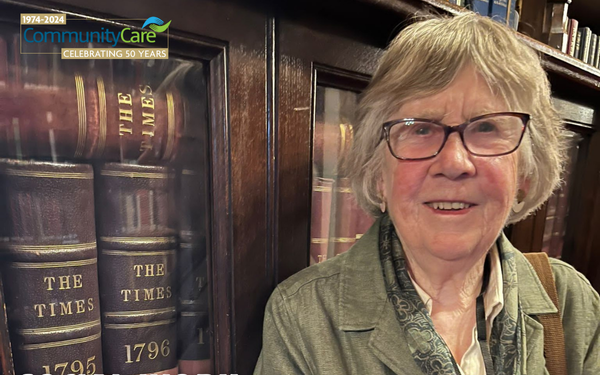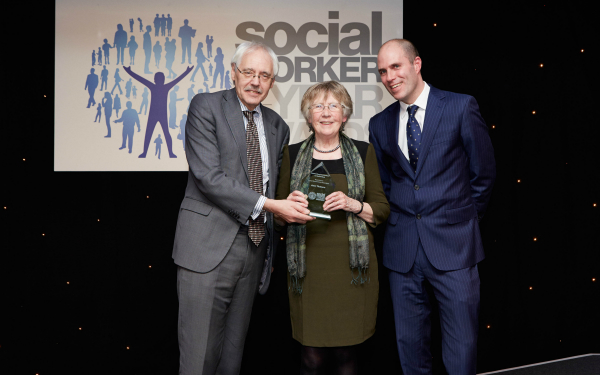
Our interview with June Thoburn is part of a series of profiles of key figures who have shaped social work over the past five decades, to mark Community Care’s 50th anniversary. Previous interviewees include Eileen Munro and Herbert Laming.
It is difficult to choose one moment from Professor June Thoburn’s career to explore. There are simply too many.
Since qualifying in the 1960s and then moving into academia, she has carried out extensive research, in the UK and overseas, about child protection, family support, adoption and services for children placed away from home.
Crucially, she has contributed to reforms that allowed parents to attend child protection conferences and been part of the advisory groups on both the Children Act 1989 and the Adoption and Children Act 2002, conducting government-commissioned research that informed the latter.
But despite the various topics available to broach, our conversation kept circling back to power.
Her interest in the subject began in the 1970s, while researching her book ‘Captive Clients’, which examined children in care returning home ‘on trial’. She was able to witness first-hand how the fear of practitioners’ power influenced parents’ behaviour – and honesty.
A loss of discretion in social work practice
During interviews with parents, Thoburn noticed that, while many held their social workers in high regard, they were often driven to lie out of fear.
In one example, a mother with obsessive compulsive disorder (OCD) was struggling following the return of her child, resulting in the child sometimes being physically reprimanded.
“She was obsessed with cleanliness and couldn’t control herself,” says Thoburn. “As a researcher, I asked, ‘Are you hitting him?’. She said, ‘Yes, sometimes. But I wouldn’t tell [my social worker].’.”
Yet while the practitioner was aware of the parent’s difficulties, and would have reported it had the situation escalated, she was able to help the family with discretion.
“That was about power. [The social worker] did not feel that her job was on the line and […] that she’d better report it.”
Thoburn has seen that discretion dissipate over the past few decades. An emerging climate of fear in social work has pressured practitioners to report incidents where a more delicate approach may have better supported the child’s safety and the family’s wellbeing, she says.
‘Serious concerns’ about mandatory reporting of abuse
A recent example of this trend, Thoburn says, is the government’s plan to require staff working with children to inform social care or the police of any incident of child sexual abuse (CSA) they witness or have disclosed to them, with a failure to do potentially leading to the person being barred from such work.
While some campaigners see the government’s plan as toothless, Thoburn, a leading opponent of so-called mandatory reporting, argues that it underestimates the complexity of CSA cases and that its introduction would damage the trust between social workers and families.

Photo: Golib Tolibov/Adobe Stock
“I have serious concerns that it will profoundly affect children’s services,” she says of the plan, which is based on a recommendation from the Independent Inquiry into Child Sexual Abuse.
Her concern lies with the loss of trust that could follow. She offers an example of someone disclosing an incident of abuse without wanting their social worker to report it, but the practitioner feeling pressured to inform the police instead of discussing how to proceed with the person they’re supporting.
Thoburn believes that for a child or parent to trust a social worker, they need to know that “they can retain some level of control over their own information”.
“The social worker, with team leader support, has to be able to use their discretion if they are to win the trust of children.”
Under the government’s plans, staff or volunteers under the duty to report would have a discretion to delay reporting in the best interests of the child.
However, because of the upcoming general election, the plan has been dropped and it will be up to the new government to decide whether to introduce it.
Celebrate those who’ve inspired you
For our 50th anniversary, we’re expanding our My Brilliant Colleague series to include anyone who has inspired you in your career – whether current or former colleagues, managers, students, lecturers, mentors or prominent past or present sector figures whom you have admired from afar.
Nominate your colleague or social work inspiration by either:
- Filling in our nominations form with a letter or a few paragraphs (100-250 words) explaining how and why the person has inspired you.
- Or sending a voice note of up to 90 seconds to +447887865218, including your and the nominee’s names and roles.
If you have any questions, email our community journalist, Anastasia Koutsounia, at anastasia.koutsounia@markallengroup.com
A social worker’s power

June Thoburn received the award for ‘Outstanding Contribution to Social Work’ at the 2016 Social Worker of the Year Awards, presented by Richard Kemp (L) of Liverpool Council and James Rook (R) of Sanctuary Social Care.
Photo: Matt Grayson
For Thoburn, everything comes back to understanding the power imbalance between practitioners and families.
In another example from ‘Captive Clients’, one prospective adoptive parent told her, “If the social worker says jump, I jump”. The fear of the social worker’s power to remove children was present in all families she spoke with.
“I don’t think enough is made about how social workers use their power,” she says now.
“Yes, you need technique, but power and relationships are the two central parts of social work and have always been there.”
That power extends beyond taking children into care. It’s also about the ability to provide or refuse a service.
“When you get a referral and a decision is taken on whether this is or isn’t a child in need, that’s huge power,” she says.
“If you say, ‘I’m not going to accommodate this child’, that child and its family lose access [to a whole range of services]. I see social work basically as a very benign and important service. But with access to a social worker comes this intervention in your life. So, it’s so central to understand the social work relationship.”
More than 40 years after Captive Clients was published, practice is more focused on intervention than forging relationships, says Thoburn.
Part of the problem, she says, lies with the term ‘intervention’ itself, which is a “short-term technique” that goes against the long-term, relationship-based model that should dictate social work.
“You take a five-year-old into care and [they] will need a relationship with a social worker for the next 20-odd years. In this notion of intervention, you go in, do something, and get out, rather than find a way of [supporting and] being alongside that person.”
Parents in child protection conferences
Thoburn has a long history of promoting parental and children’s rights within social care.
In the late 1980s, she led an influential piece of research which led to parents having the right to attend child protection conferences.
Despite initially being a “tiny piece of research” conducted in Hackney, its results coincided with the 1988 Cleveland Inquiry report. This examined the circumstances behind 121 children from the area being removed from their families the previous year because of suspected child sexual abuse, on the evidence of paediatricians. Most of the children were subsequently returned, and the inquiry was critical of the way practitioners had treated parents.
One of the inquiry’s recommendations was that councils should inform parents about child protection case conferences and invite them to attend, other than in exceptional circumstances. Previously, there was no entitlement for parents to attend, despite the risk that child protection action could lead to proceedings to take their children into care.
When the government decided to trial the reform, Thoburn’s research received funding to expand, eventually leading to statutory guidance requiring parents to be invited to participate.
The changes shook up how these meetings were conducted – they started being “properly recorded and bringing in trained, impartial social workers to chair”, Thoburn says.
“One of the key aspects of our research was that the chair was neutral and would meet the parent beforehand to explain what was going on. Before that, the chair of those meetings was the team leader, who was hardly impartial.”
This research set the tone for the rest of Thoburn’s career, as she has continued to fight for parents’ and children’s voices to be heard and included in decision making.
‘The law has improved, but practise hasn’t’
However, decades later, she says that while the rights of people involved with social services have improved, practice has not.
“There’s less flexibility in the nature of the service that’s offered. [It’s] taking away the discretion to consult with the parents and say, ‘What do you think’s going to help you?’.”
Thoburn recalls supporting a young mother with early stages of Parkinson’s disease. She had prioritised asking the mother what kind of service she sought – help with practical things, like money, or a more in-depth, relationship-based service that would also look into her mental state.
“She opted for the practical things. We worked together for a long time as she did have a lot of needs, but equally, I didn’t do the more psychologically-based counselling because she didn’t want to delve into that. And I went to that person’s wedding,” says Thoburn.
“I could have referred her to a mental health service. But [it was important] to have that conversation of, ‘What sort of service do you want from me?’.”
This is a rarity nowadays, she says, largely due to constraints brought about by high and complex caseloads, a lack of time, workforce and funding, and cases being passed from practitioner to practitioner.
Share your story

Picture: daliu/fotolia
Would you like to write about a day in your life as a social worker? Do you have any stories, reflections or experiences from working in social work that you’d like to share or write about?
If so, email our community journalist, Anastasia Koutsounia, at anastasia.koutsounia@markallengroup.com
The impact of fast-track courses
Part of it, she notes, is also new generations of social workers becoming more comfortable with following a set list of techniques, rather than reflecting on suitable approaches to use.
“Scaling questions, motivational interviewing – it’s important to know about these new models. But this is where casework comes in and where you decide whether this particular intervention works,” says Thoburn.
“For example, where does an intervention fit with the notion of poverty? You don’t go in and say, ‘Well the service we offer is 10 sessions of parenting training’, when you know the kid is just refusing to eat from the food bank.”
She attributes this, in part, to the growing number of practitioners being trained through fast-track courses that see them qualifying in just over a year.
“These fast-tracks emphasise technique, rather than reflection,” says Thoburn, who used to teach on university social work programmes “There isn’t a lot of time to really think about the ethics.”
There are two fast-track schemes geared towards training children’s social workers – Step Up to Social Work and Frontline – and Thoburn appears to have in mind the model used by the latter, which is, broadly, replicated by mental health scheme Think Ahead.
Under this, trainees enter an intensive five-week course before transitioning to a year of learning through employment, where they are managed and supervised by experienced practitioners.
They undertake further study during their qualifying year and are then expected to complete a master’s in social work following qualification.
Frontline says its curriculum “develops reflective practitioners, who are able to demonstrate a deep and systematic value and ethical base underpinning all social work practice and academic activities”.
However, Thoburn believes that that the immediate shift from study to employment setting undermines their learning journey.
“There’s not a lot of time to contemplate whether they like how [things are done] in this authority. Whereas, when you have placements, the student can say, ‘I like what they do here, but I’m not so sure about that’, and discuss that with their tutor or other students in different placements.
“There is a difference between being a trainee and being a student.”
Yet Thoburn admits that having the financial stability that fast-track programmes offer can be attractive – especially with so many university social work students struggling due to inadequate bursaries.
It is something she hopes will be addressed by the new government.
‘There’s an elephant in the room for the new government’

Image: 5second
This is likely to be a Labour administration, with the party currently 20 percentage points ahead of the Conservatives in the polls, with less than two weeks to go until the 4 July election.
The party has so far announced that it would introduce fair pay for adult social care workers, but has made no funding commitments to either children’s or adults’ social care, let alone social work education.
“I think if there’s an elephant in the room for the next government, and it’s lack of proper funding for local authorities,” says Thoburn, who is secretary of the Labour Social Work Group, for practitioners who are members of the party.
Like others, she’d like to see a national recruitment campaign for social workers, better bursaries and, ideally, a minister with responsibility for both children’s and adult social care, to bridge the gap between services.
The positives in UK social work
However, while the country mulls over the myriad issues that face social care, Thoburn points out that not enough credit is given to the permanence the sector secures for children.
The UK’s children social care system has managed to redefine and provide permanence for children in ways that other countries Thoburn has researched in – including America and Canada – have not, she says.
“[We] decided that [permanence] is more than adoption. You can place a 15-year-old with a foster family and it might be that it will put down roots and that will be their family for life. It’s not just about babies,” she says.
“Research has shown that children need stability, love, relationships and we really emphasise that [in practice]. If only the resources, particularly the social workers, were available.”
Which influential figures in social work would you like to see Community Care profile?





 Bournemouth, Christchurch and Poole
Bournemouth, Christchurch and Poole  Hampshire County Council
Hampshire County Council  Oxfordshire County Council
Oxfordshire County Council  South Gloucestershire Council
South Gloucestershire Council  Wokingham Borough Council
Wokingham Borough Council  Embedding learning in social work teams through a multi-agency approach
Embedding learning in social work teams through a multi-agency approach  The family safeguarding approach: 5 years on
The family safeguarding approach: 5 years on  Harnessing social work values to shape your career pathway
Harnessing social work values to shape your career pathway  Webinar: building a practice framework with the influence of practitioner voice
Webinar: building a practice framework with the influence of practitioner voice  Workforce Insights – showcasing a selection of the sector’s top recruiters
Workforce Insights – showcasing a selection of the sector’s top recruiters  Free CPD on Parkinson’s for health and social care staff
Free CPD on Parkinson’s for health and social care staff 

 Facebook
Facebook X
X LinkedIn
LinkedIn Instagram
Instagram
A hugely valued and influential (for the good) social worker and academic who continues to contribute so much to the profession.
Community Care may have forgotten to mention that, aside from being awarded an outstanding contribution award at the corporately-sponsored Social Work Awards nine years ago(!), June was more recently given a lifetime achievement award by the British Association of Social Workers (BASW) at its 2023 conference and AGM, proposed and voted for by BASW members, as is fitting for a social worker of such reputation and standing: https://new.basw.co.uk/articles/june-thoburn-david-n-jones-receive-lifetime-achievement-awards-basw-agm
I agree Christian but what also of Hilary Searing, The Barefoot Social Worker? And, really, on the question of mandatory reporting, as recommended by iicsa, there are countless pioneering leaders who too failed to act and they too know it.Indeed, one could write dialectically about how Social Work has arrived at it’s position today because of such matters; I dare you 😉
The desire for a positive interpellation of Social Work denies and defies the waking reality of it’s recipients; for sure there’s great value in the work being done but when the industry, as a whole, negates the negative of living in advanced liberal democracies through a particular gaze it’s inevitable that the mirrors will portray a distorted image. See Julie Reshetnikova on Negative Psychoanalysis for more …
I just rummaged through some old work with Patrick Hoverstadt, of Fractal Consulting Ltd, and it strikes me that there’s a glaring omission in the story being told of our application of theory to practice ~ the term parallel planning is seated entirely upon a Bayesian Model of risk determination, and the term parallel planning derived from such thinking; Where’s the commentary on the ‘how’ of decision making? If social work seeks the moral highroad on issues of trust then let’s have a proper conversation about it.
Does anyone remember Still Bridging Bridges? Well, like ‘Working Together” it has now morphed into the latest version of some IT kit or other.
The most recent coverage of which emerged from the use of Profilers for Adhd and Autism.
The use of words like relational to most of us means literally the real world demands/risks posed by self and others of somebody who one actually know, obviously right?
Wrong: relational in IT speak is the computational significance of a correlation between how the data subject responds to a computational metric system and, then, how this relates to a background algorithm rating of risk based on the super language model is use.
It has nothing to do with the real relationships at all. For sure, they can be useful proxy but it is only a proxy.
It is though huge and lucrative business.
The talk of increasing bureaucratic burden is in fact, I suggest, directly derived from the poor design of the IT architecture ~ digitisation and interoperability has failed and failed miserably for the past two decades if not longer.
IT procurement is a nightmare and long known for the accummulative nature of error production ~ called ontic quales.
Think ‘Horizon’ and ask how many times people in need of help are poorly served because the computer generated pictures say so.
The scale of this ‘legacy’ and blunder across all NHS and Social Services is yet to be told.
SWE, are sewn-in to the problem creation with very little say so on the actual impact at Local Authority level.
For more on this see Sha Xin Wei, Navigating Indeterminacy.
If, Every Child Matters, then the processes of measuring them, like all other vulnerable populations, Matters Too ~ Quality Protects was meant to help, did it?
Q: Has the digitisation of Social Work created the conditions for an institutionalised shame or grandiosity, as the polarised metric-ends, of a narcissistic narrative ?
the other glaring omission is a much harder ask for discussion, although runs through most of the threads covered by CC; State services are inherently also CofE and colonial, the latent value base of which is the unconscious bias written into much of the concealed algorithmic design ~ the rest is an aesthetic purporting the espousal of social work values and the reality speaks to something very different…